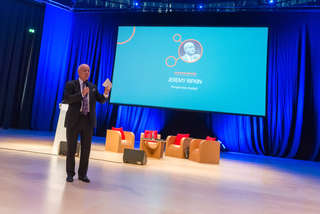The Luxembourg Sustainability Forum 2015, organised in the context of the Luxembourg Presidency of the Council of the EU, was held in the Grand Duchy on 24 September 2015. A number of experts discussed the concept of responsible finance, as well as the means to revamp territories and digital technology for sustainable development. The highlight of the conference was the presentation by American economist and futurist, Jeremy Rifkin, who spoke on his theory of a Third Industrial Revolution. Earlier, the economist had signed an agreement with the Luxembourg government to launch a study on what strategy should be adopted by Luxembourg to help turn it into a pioneering country in this new revolution.
Jeremy Rifkin maintains that the Second Industrial Revolution, which is characterised by, inter alia, the combination of inexpensive energy and oil, the combustion engine, the centralisation of production of electricity and communication networks, is waning. This has resulted in a dramatic decline in productivity, a global slowdown in growth, increased unemployment and global warming which is directly linked to the huge amounts of CO2 released into the atmosphere during the First and Second Industrial Revolutions. The key role played by fossil fuels in today's world - the reserves of which are being depleted, with prices continuing to rise - has been brought to the fore in this context.
The convergence of new digital technologies
 Jeremy Rifkin believes it is necessary to adopt a new economic paradigm. Supported by a sharing economy, this revolution is characterised by the implementation of smart systems capable of increased adaptability by allocating resources more efficiently (and therefore lowering costs) and creating inter-connectivity between systems. A fundamental transformation based on the convergence of new digital technologies: a Communication Internet, a Renewable Energy Internet which provides for a massive deployment of storage system technologies using the energy being generated more and more in a decentralised way by individuals, and an 'automated Transportation and Logistics Internet' which uses electric and fuel cell vehicles.
Jeremy Rifkin believes it is necessary to adopt a new economic paradigm. Supported by a sharing economy, this revolution is characterised by the implementation of smart systems capable of increased adaptability by allocating resources more efficiently (and therefore lowering costs) and creating inter-connectivity between systems. A fundamental transformation based on the convergence of new digital technologies: a Communication Internet, a Renewable Energy Internet which provides for a massive deployment of storage system technologies using the energy being generated more and more in a decentralised way by individuals, and an 'automated Transportation and Logistics Internet' which uses electric and fuel cell vehicles.
The speaker explained that the changes brought about by the Communication Internet, in particular allowing users to produce and distribute directly their own content, will be identical to those relating to the new energy and transportation grids. The Renewable Energy Internet seeks to move away from a centralised electricity system, replacing it with decentralised production with millions of micro producers feeding the network with their surplus energy. "That's already the case for several million early adopters in the EU who have transformed their homes and businesses into micro power plants by harvesting renewable energy on the spot", he explained.
Another factor, according to Jeremy Rifkin, is industrial production whereby giant vertically integrated companies develop horizontally and promote 3D printing technology, heralding the arrival of a new generation of micro power plants.
In that context, the horizontal production of renewable energy and goods will help to drastically reduce costs to the extent that they may even disappear. After the infrastructure costs have been absorbed, renewable energy costs are almost free, stated Jeremy Rifkin. He also stressed that traditional industries are based on inefficient techniques of energy and resource extraction, which results in the waste of both energy and resources, whereas 3D printing maximises their use. In that context, he believes that "for the first time in history, the entire human race can collaborate directly with one another, and thereby democratising economic life", which is less dependant on the market and increasingly more reliant on collaboration.
Towards the creation of a super-Internet of Things
According to Jeremy Rifkin, the convergence of technology and theses changes result in the creation of a "Super Internet of Things". Under the new paradigm, intelligent sensors will be embedded into all objects and attached to all forms of infrastructure (offices, homes, vehicles, roads, factories and electricity grids) allowing them to communicate with each other and with users, "providing real time data to make it possible to rationalise the management, power supply and transport of economic activity". "By 2030, it is estimated there will be more than 100 trillion sensors connecting the human and natural environment in a global, intelligent and horizontal network", stated Jeremy Rifkin, who outlined that the revolution could make the EU "the most efficient hi-tech hub in the world".
However, the economist is aware of the risks and challenges resulting from the digitalisation of communication, energy and transportation. It will in particular involve guaranteeing network neutrality (the same access for everyone), preventing the creation of new corporate monopolies, protecting personal privacy, ensuring data security, and fighting cyber-crime and cyber-terrorism. "These challenges will involve the next three generations", asserted Jeremy Rifkin.
Jeremy Rifkin also mentioned the risks bearing on employment in the light of increasing robotisation. But he believes that there is already a "migration of employment ... to the growing social economy" and "the amassing of social capital ... requires human-to-human engagement, not machines" which cannot, in any event, perform roles in education, the environment, culture and social activity. Robotisation could in this way give the thankless jobs to machines, leaving the creative tasks to humans.
The Luxembourg Minister for the Economy, Etienne Schneider, stated at the end of the conference that, "in any event, the Third Industrial Revolution is going to happen". "We have the opportunity of being in the driving seat and to make progress in the way that we want to", he said.

